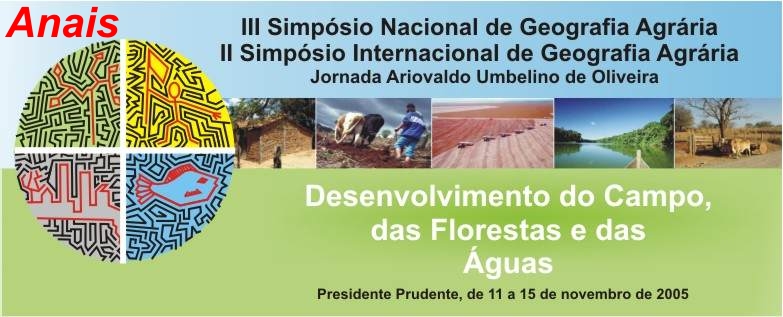In 1997, following
a series of discussions about the Brazilian agrarian question,
a group of researchers associated with the University of São
Paulo (USP) Rural Geography Lab and the Rural Studies Section
of the Brazilian Geographers’ Association (AGB) decided
to broaden the debate to place the question in the contest of
Brazil’s increased economic internationalization.
The First National Rural Geography Symposium emerged from these
discussions. Round tables were organized on the following themes:
“The Contradictions of Development in the Brazilian Countryside,”
“The Law and Alternative Forms of Property in Brazil,”
and “Peasant Agriculture and Sustainability.” The
symposium also features two panel discussions, testimonies from
various specialists, and a photographic exhibit. More than 100
people participated in the event and it succeeded in becoming
a point of reference for broad reflection about Brazil’s
agrarian question.
To reinvigorate and expand the discussion, the Second National
Rural Geography Symposium and the First International Rural Geography
Symposiums were held November 5-8, 2003. The organizers insisted
on the necessity of deepening the Brazilian agrarian reform debate
with some hope of extracting a singular vision of rural society.
“The Countryside in the 21st Century: Territory of Life,
Struggle, and Social Justice” was chosen as a unifying symposium
theme. By introducing the international symposium, the meeting
intended to break with the limits of national boundaries and generate
theories to help reflect on the persistence of the agrarian question
in many countries of the world.
The Second Symposium, with its international reach, hosted two
panel discussions, five round tables, and various other activities
for the more than 150 professors, undergraduate and graduate students
who participated. Panel themes were “Roots and Routes of
Rural Geography” and “Knowledge and Resistance.”
The tables took on the complex but unifying topics of “Rural
Geography Perspectives,” “Traditional Lifestyles,”
“Indigenous Lands and Conservation,” “Social
Movements and Agrarian Reform,” and “Rural Development
and Public Policy.” In a series of events that recalled
a successful periodic practice of the USP Rural Geography Lab
– “Thursday Conversations” – militants
from some Latin American social movements spoke off the cuff about
their experiences and the significance of their struggles. Open
sessions attracted paper presentations on the themes of “Rural
Geography Thought,” “Traditional Communities”
and “Social Movements and Public Policy.”
At the plenary, participants voted to schedule the Third National
and Second International Rural Geography Symposium at the Paulista
State University (Unesp) campus in Presidente Prudente, São
Paulo. This event is being planned by working groups, laboratories,
and research centers linked to the USP Geography Department, the
Unesp Geography Department and the geography graduate programs
at both institutions.
Welcoming a diversity of perspectives, studies and activities,
the new symposium’s theme – Land, Forest, and Water
Development – intends to broaden still farther debate on
the worldwide agrarian question. The Symposium will also host
the Ariovaldo Umbelino de Oliveira Day, designed to honor the
contributions of this important Brazilian geographer.


